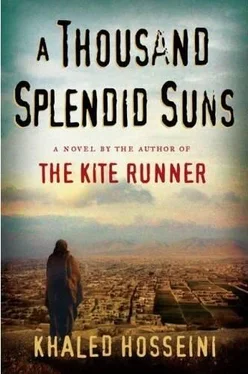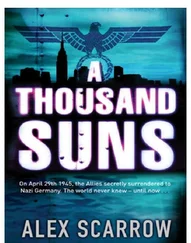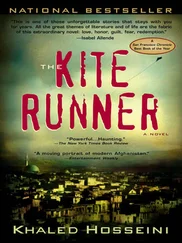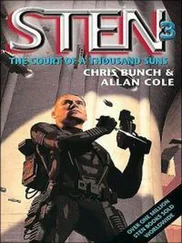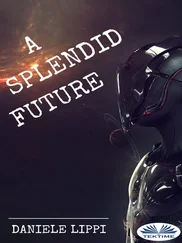THEN ONE NIGHT, a few weeks after Zalmai turned two, Rasheed came home with a television and a VCR. The day had been warm, almost balmy, but the evening was cooler and already thickening into a starless, chilly night.
He set it down on the living-room table. He said he'd bought it on the black market. "Another loan?" Laila asked.
"It's a Magnavox."
Aziza came into the room. When she saw the TV, she ran to it. "Careful, Aziza jo," said Mariam. "Don't touch."
Aziza's hair had become as light as Laila's. Laila could see her own dimples on her cheeks. Aziza had turned into a calm, pensive little girl, with a demeanor that to Laila seemed beyond her six years. Laila marveled at her daughter's manner of speech, her cadence and rhythm, her thoughtful pauses and intonations, so adult, so at odds with the immature body that housed the voice. It was Aziza who with lightheaded authority had taken it upon herself to wake Zalmai every day, to dress him, feed him his breakfast, comb his hair. She was the one who put him down to nap, who played even-tempered peacemaker to her volatile sibling. Around him, Aziza had taken to giving an exasperated, queerly adult headshake.
Aziza pushed the TV's power button. Rasheed scowled, snatched her wrist and set it on the table, not gently at all.
"This is Zalmai's TV," he said.
Aziza went over to Mariam and climbed in her lap. The two of them were inseparable now. Of late, with Laila's blessing, Mariam had started teaching Aziza verses from the Koran. Aziza could already recite by heart the surah of ikhlas, the surah of fatiha, and already knew how to perform the four ruqats of morning prayer.
It's oil I have to give her, Mariam had said to Laila, this knowledge, these prayers. They're the only true possession I've ever had.
Zalmai came into the room now. As Rasheed watched with anticipation, the way people wait the simple tricks of street magicians, Zalmai pulled on the TV's wire, pushed the buttons, pressed his palms to the blank screen. When he lifted them, the condensed little palms faded from the glass. Rasheed smiled with pride, watched as Zalmai kept pressing his palms and lifting them, over and over.
The Taliban had banned television. Videotapes had been gouged publicly, the tapes ripped out and strung on fence posts. Satellite dishes had been hung from lampposts. But Rasheed said just because things were banned didn't mean you couldn't find them.
"I'll start looking for some cartoon videos tomorrow," he said. "It won't be hard. You can buy anything in underground bazaars."
"Then maybe you'll buy us a new well," Laila said, and this won her a scornful gaze from him.
It was later, after another dinner of plain white rice had been consumed and tea forgone again on account of the drought, after Rasheed had smoked a cigarette, that he told Laila about his decision.
"No," Laila said.
He said he wasn't asking.
"I don't care if you are or not."
"You would if you knew the full story."
He said he had borrowed from more friends than he let on, that the money from the shop alone was no longer enough to sustain the five of them. "I didn't tell you earlier to spare you the worrying."
"Besides," he said, "you'd be surprised how much they can bring in."
Laila said no again. They were in the living room. Mariam and the children were in the kitchen. Laila could hear the clatter of dishes, Zalmai's high-pitched laugh, Aziza saying something to Mariam in her steady, reasonable voice.
"There will be others like her, younger even," Rasheed said. "Everyone in Kabul is doing the same."
Laila told him she didn't care what other people did with their children.
"I'll keep a close eye on her," Rasheed said, less patiently now. "It's a safe corner. There's a mosque across the street."
"I won't let you turn my daughter into a street beggar!" Laila snapped.
The slap made a loud smacking sound, the palm of his thick-fingered hand connecting squarely with the meat of Laila's cheek. It made her head whip around. It silenced the noises from the kitchen. For a moment, the house was perfectly quiet. Then a flurry of hurried footsteps in the hallway before Mariam and the children were in the living room, their eyes shifting from her to Rasheed and back.
Then Laila punched him.
It was the first time she'd struck anybody, discounting the playful punches she and Tariq used to trade. But those had been open-fisted, more pats than punches, self-consciously friendly, comfortable expressions of anxieties that were both perplexing and thrilling. They would aim for the muscle that Tariq, in a professorial voice, called the deltoid.
Laila watched the arch of her closed fist, slicing through the air, felt the crinkle of Rasheed's stubbly, coarse skin under her knuckles. It made a sound like dropping a rice bag to the floor. She hit him hard. The impact actually made him stagger two steps backward.
From the other side of the room, a gasp, a yelp, and a scream. Laila didn't know who had made which noise. At the moment, she was too astounded to notice or care, waiting for her mind to catch up with what her hand had done. When it did, she believed she might have smiled. She might have grinned when, to her astonishment, Rasheed calmly walked out of the room.
Suddenly, it seemed to Laila that the collective hardships of their lives – hers, Aziza's, Mariam's – simply dropped away, vaporized like Zalmai's palms from the TV screen. It seemed worthwhile, if absurdly so, to have endured all they'd endured for this one crowning moment, for this act of defiance that would end the suffering of all indignities.
Laila did not notice that Rasheed was back in the room. Until his hand was around her throat. Until she was lifted off her feet and slammed against the wall.
Up close, his sneering face seemed impossibly large. Laila noticed how much puffier it was getting with age, how many more broken vessels charted tiny paths on his nose. Rasheed didn't say anything. And, really, what could be said, what needed saying, when you'd shoved the barrel of your gun into your wife's mouth?
IT WAS THE RAIDS, the reason they were in the yard digging. Sometimes monthly raids, sometimes weekly. Of late, almost daily. Mostly, the Taliban confiscated stuff, gave a kick to someone's rear, whacked the back of a head or two. But sometimes there were public beatings, lashings of soles and palms.
"Gently," Mariam said now, her knees over the edge. They lowered the TV into the hole by each clutching one end of the plastic sheet in which it was wrapped
"That should do it," Mariam said.
They patted the dirt when they were done, filling the hole up again. They tossed some of it around so it wouldn't look conspicuous.
"There," Mariam said, wiping her hands on her dress.
When it was safer, they'd agreed, when the Taliban cut down on their raids, in a month or two or six, or maybe longer, they would dig the TV up.
IN LAILA'S DREAM, she and Mariam are out behind the toolshed digging again. But, this time, it's Aziza they're lowering into the ground. Aziza's breath fogs the sheet of plastic in which they have wrapped her. Laila sees her panicked eyes, the whiteness of her palms as they slap and push against the sheet. Aziza pleads. Laila can't hear her screams. Only for a while, she calls down, it's only for a while. It's the raids, don't you know, my love? When the raids are over, Mammy and Khala Mariam will dig you out. I promise, my love. Then we can play. We can play all you want. She fills the shovel. Laila woke up, out of breath, with a taste of soil in her mouth, when the first granular lumps of dirt hit the plastic.
Mariam
In the summer of 2000, the drought reached its third and worst year.
Читать дальше
